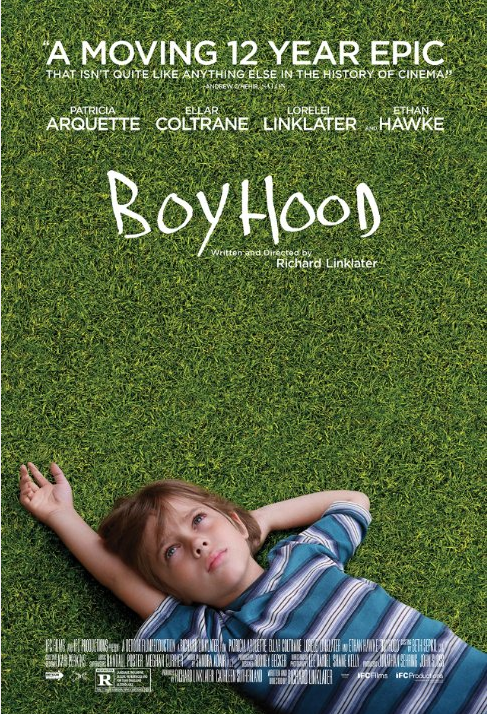Why would I want to pay, let alone watch, a movie that just narrates random events of a child? That was the question that popped into my mind when I first heard of the premise of the film Boyhood. Little did I know that that small movie would be one of the most unique landmarks of modern cinema.
Boyhood introduces Mason Evans, Jr. (Ellar Coltrane) as a naïve six year-old and follows him as he navigates life with his sister Samantha (Lorelei Linklater) and divorced parents Olivia (Patricia Arquette) and Mason, Sr. (Ethan Hawke). As time passes by, we witness several instances in his life. He plays bowling without the safety bars. He camps with his father and they bond over Star Wars. He meets his to-be girlfriend in a party. The film chronicles his life from that little boy contemplating in the grass to the rebellious, emo teenager to the mature college-bound student. There’s no coherent story in the film, which might turn some people off. And yet, every moment somehow seems precious.
Critics may point out its use of clichéd characters, but the unconventional storytelling effectively shares the events that molds Mason into the young man he becomes. A few people close to him unravel due to alcoholism; although he occasionally drinks as a teenager, he never lets the liquor control him. His philosophical monologues stem from socio-political conversations with his father in bowling alleys as a kid. Every major adult in his life persuades him to conform to what they want him to become; one stepfather forcefully cuts his long hair to “help” him in his journey to “become a real man.” What is a “real man,” anyway? With all the pressure mounted on him, Mason ponders his future and seems directionless when he reaches high school, but it’s a nice touch that we never realize in the end what he aspires to become, or whether or not he has decided at all.
Boyhood also shows that the parents, despite being based on familiar archetypes, require growing up too. The confused, traditional Olivia becoming an empowered, confident woman later on in life echoes Mason’s uncertainty (or lack thereof) of his future during his youth. The initially carefree Mason Sr. accepts his responsibilities once he starts another family of his own, similar to how his son finishes high school and ponders on what to do next towards the film’s conclusion.
The little details that make the film special require time to think about, and the movie never becomes sentimental. When bad things happen to Mason, why have a bitter rant when it can be expressed facially? There’s one moment near the film’s end that might be tear-jerking, but it’s for a true, realistic reason, and there’s no over-emoting. For a movie about time, nostalgia is surprisingly sparse in the movie, and only appears when the story needs it. Time passes by quickly in the film, but every moment counts. Boyhood is not for some casual viewers; since what makes it distinct to others is that it enriches the moments that people may find insignificant.
The simple idea of narrating a boy’s story benefits from the vision of director and writer Richard Linklater. Not only is he experienced with several genres, but he is also a master at making the small stuff matter. In the Before Sunrise trilogy, he spiced up romantic chitchat to make it more realistic. He explored teen culture with Dazed and Confused (1993) and debut Slacker (1991). And then he made School of Rock (2003). Linklater knows how movies of different styles work, but Boyhood, adapted mostly from his own childhood, is his most personal work yet. The scope of his ambition is evident in the filming process: the film was shot in 39 days over 12 years.
One of Linklater’s advantages with Boyhood is a cast that stuck throughout the twelve years of filming. It’s surreal seeing the Before Sunset-era Ethan Hawke as Mason’s slacker father who only visits him occasionally, but it’s even more alluring to see Hawke’s growth as an actor, as he naturally delivers the different sides of Mason, Sr., from the slacker that tries to win over his young son to the mature grownup that imparts practical wisdom to an older Mason. Patricia Arquette delivers a memorable performance as Olivia that helps us empathize and relate with the single mother. Even when Olivia makes impulsive decisions or brings home the wrong men, we understand that all her decisions are for the sake of her children. Lorelei Linklater, the director’s daughter, is underrated, as she brings the sass that makes Samantha different from Mason as both of them grow up together and eventually branch out to their own interests and stories. It’s surprising, however, that Ellar Coltrane, despite having little experience with acting, delivers an unforgettable performance as Mason, and manages to convey the hero’s journeys of learning, love and loss as time passes by, and to transform it into something special. It’s hard to describe it in other words.
It’s a miracle how beautifully shot the film is despite being deceptively simple. Linklater sets the movie in his home state of Texas, and, alongside cinematographers Lee Daniel and Shane Kelly, uses the gorgeous scenery of the fourth largest state to the film’s advantage. The bright, green plains of the state and the sprawling city of Austin accompanies Mason, Sr. drives his kids around, while smaller, dimly lit places generate the intimacy felt by the characters with each other. Time jumps take us through each year of Mason’s life, yet the transitions feel very authentic and natural, without being jarring, largely due to the consistency in direction, cinematography and character.
Boyhood also makes good use of pop culture to show how time passes, from Mason watching Dragon Ball Z to his father’s quest in 2008 to promote Obama for president. Coldplay’s “Yellow”, which became popular in 2002, opens the film (which begins in 2002) and we’re also brought through a musical experience ranging from Blink 182 to Arcade Fire to High School Musical (Also worth noting is “Hero” by Family of the Year, the film’s sublime theme song).
Mason’s boyhood, from the random yet realistic events of his life to the clever pop culture references, is relatable because it’s not much different from ours. The film, however, stretches beyond that. Supported by excellent direction, acting and cinematography, it’s a landmark movie because it not only celebrates every moment we experience, but is a reminder of what came before and what we can do now. Feeling more like an immersion than a piece of art, it’s an epic that doesn’t try to be epic. Boyhood shines because it elevates the simple, quiet moments in life – such as growing up – into something extraordinary.
Written by Joel Lim




